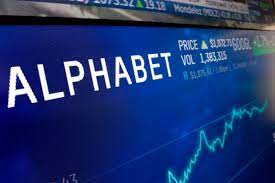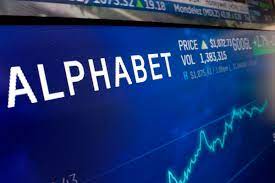
With the announcement of Alphabet's first-ever dividend and $70 billion stock purchase on Thursday, investors were ecstatic and the stock shot up about 16% after the bell.
The parent company of Google is making a profit while building billion-dollar data centres in an effort to overtake competitors in the field of generative artificial intelligence. Each share will receive a 20-cent dividend.
Three months ago, Meta Platforms, Alphabet's Big Tech rival, opened a new tab and declared its first-ever dividend, a move that increased the social network company's stock market value by $196 billion the next day. Among Big Tech companies, Amazon.com is the only one that does not issue a dividend.
In terms of highly watched indicators like sales, earnings, and advertising, Alphabet exceeded projections for the period.
"Alphabet's announced dividend payouts and buybacks on top of the solid earnings beat are not only a breath of fresh air for the tech market as a whole, but also a very intelligent strategy for the search engine giant going into a tough time of the year," said Thomas Monteiro, senior analyst at Investing.com.
Following the revelation, Alphabet's shares surged by around 16% after hours, increasing the company's stock market worth by approximately $300 billion to over $2 trillion.
CEO Sundar Pichai hailed Google's AI products as a benefit to its core search results on a call to discuss the results. "We are encouraged that we are seeing an increase in search usage among people who are using the AI overviews," he stated.
LSEG data shows that revenue for the quarter ended March 31 was $80.54 billion, versus projections of $78.59 billion.
One music label executive who sees possible benefits from a U.S. ban on Tiktok is JP Morray.
Due to growing demand for its cloud services as a result of growing AI usage and stable ad spending, the search engine company topped expectations on first-quarter revenue.
According to Google, sales of ads increased 13% during the quarter to $61.7 billion. In comparison, LSEG figures show that the average estimate is $60.2 billion.
Following a fourth quarter in which ad revenue fell short of expectations and sent Alphabet's shares down, the company is facing increased competition from Facebook, Amazon.com, and newcomers like TikTok. President Joe Biden approved a bill that will prohibit the widely used app if it is not sold within the next nine to twelve months, therefore the latter's future is now questionable.
In the first quarter, Google Cloud's revenue increased by 28% due to the surge in generative AI tools, which depend on cloud services to provide clients with technology.
Capital expenditures at Alphabet totaled $12 billion, up 91% from the previous year. Hanna Howard, portfolio manager at Gabelli Funds, described this amount as "higher than anticipated."
Nevertheless, CFO Ruth Porat stated during the analyst call that she anticipates these costs to remain at that level or higher for the balance of the year as the business makes investments to develop its artificial intelligence services.
Porat stated that, despite the increase in capital expenditures, the operating margin will be better in 2024 than it was in the previous year.
According to investors and experts, Google's cloud services are appealing to firms with venture capital backing that are building generative AI solutions because of their affordability and simplicity of integration with other tools.
Google has marketed Gemini, an AI-powered chatbot, as the solution to all automation problems, including coding and document generation. However, as it was discovered that the software produced historically incorrect photos, notably of former American leaders and German soldiers from World War Two, it was heavily criticised.
Google has acknowledged the problems and stated that it is attempting to fix them.
(Source:www.moneycontrol.com)
The parent company of Google is making a profit while building billion-dollar data centres in an effort to overtake competitors in the field of generative artificial intelligence. Each share will receive a 20-cent dividend.
Three months ago, Meta Platforms, Alphabet's Big Tech rival, opened a new tab and declared its first-ever dividend, a move that increased the social network company's stock market value by $196 billion the next day. Among Big Tech companies, Amazon.com is the only one that does not issue a dividend.
In terms of highly watched indicators like sales, earnings, and advertising, Alphabet exceeded projections for the period.
"Alphabet's announced dividend payouts and buybacks on top of the solid earnings beat are not only a breath of fresh air for the tech market as a whole, but also a very intelligent strategy for the search engine giant going into a tough time of the year," said Thomas Monteiro, senior analyst at Investing.com.
Following the revelation, Alphabet's shares surged by around 16% after hours, increasing the company's stock market worth by approximately $300 billion to over $2 trillion.
CEO Sundar Pichai hailed Google's AI products as a benefit to its core search results on a call to discuss the results. "We are encouraged that we are seeing an increase in search usage among people who are using the AI overviews," he stated.
LSEG data shows that revenue for the quarter ended March 31 was $80.54 billion, versus projections of $78.59 billion.
One music label executive who sees possible benefits from a U.S. ban on Tiktok is JP Morray.
Due to growing demand for its cloud services as a result of growing AI usage and stable ad spending, the search engine company topped expectations on first-quarter revenue.
According to Google, sales of ads increased 13% during the quarter to $61.7 billion. In comparison, LSEG figures show that the average estimate is $60.2 billion.
Following a fourth quarter in which ad revenue fell short of expectations and sent Alphabet's shares down, the company is facing increased competition from Facebook, Amazon.com, and newcomers like TikTok. President Joe Biden approved a bill that will prohibit the widely used app if it is not sold within the next nine to twelve months, therefore the latter's future is now questionable.
In the first quarter, Google Cloud's revenue increased by 28% due to the surge in generative AI tools, which depend on cloud services to provide clients with technology.
Capital expenditures at Alphabet totaled $12 billion, up 91% from the previous year. Hanna Howard, portfolio manager at Gabelli Funds, described this amount as "higher than anticipated."
Nevertheless, CFO Ruth Porat stated during the analyst call that she anticipates these costs to remain at that level or higher for the balance of the year as the business makes investments to develop its artificial intelligence services.
Porat stated that, despite the increase in capital expenditures, the operating margin will be better in 2024 than it was in the previous year.
According to investors and experts, Google's cloud services are appealing to firms with venture capital backing that are building generative AI solutions because of their affordability and simplicity of integration with other tools.
Google has marketed Gemini, an AI-powered chatbot, as the solution to all automation problems, including coding and document generation. However, as it was discovered that the software produced historically incorrect photos, notably of former American leaders and German soldiers from World War Two, it was heavily criticised.
Google has acknowledged the problems and stated that it is attempting to fix them.
(Source:www.moneycontrol.com)














